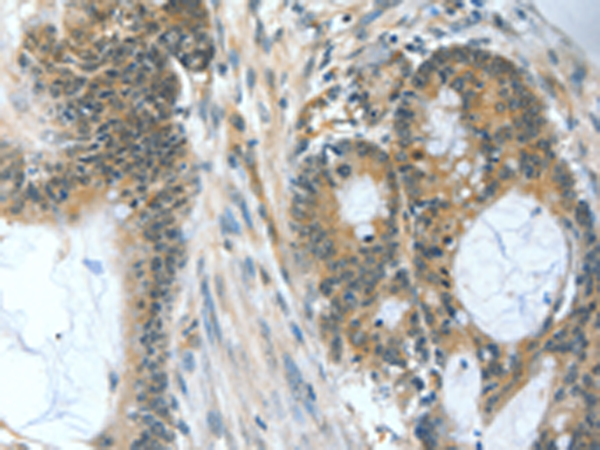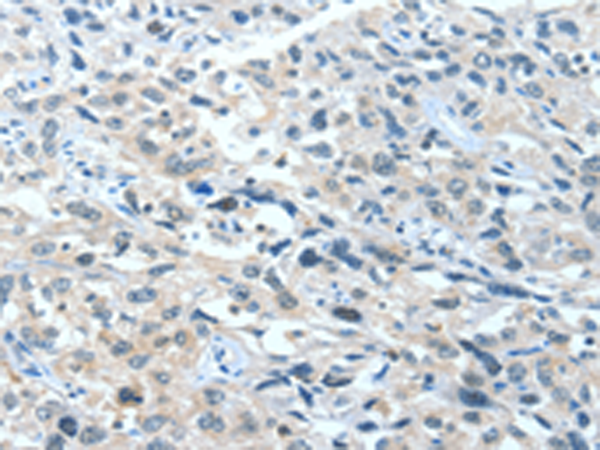

| WB | 咨询技术 | Human,Mouse,Rat |
| IF | 咨询技术 | Human,Mouse,Rat |
| IHC | 1/50-1/200 | Human,Mouse,Rat |
| ICC | 技术咨询 | Human,Mouse,Rat |
| FCM | 咨询技术 | Human,Mouse,Rat |
| Elisa | 1/1000-1/5000 | Human,Mouse,Rat |
| Aliases | BBC2; BCL2L8 |
| Host/Isotype | Rabbit IgG |
| Antibody Type | Primary antibody |
| Storage | Store at 4°C short term. Aliquot and store at -20°C long term. Avoid freeze/thaw cycles. |
| Species Reactivity | Human |
| Immunogen | Fusion protein of human BAD |
| Formulation | Purified antibody in PBS with 0.05% sodium azide and 50% glycerol. |
+ +
以下是关于BAD抗体的3篇代表性文献,涵盖其功能及检测应用:
---
1. **文献名称**:Serine phosphorylation of death agonist BAD in response to survival factor results in binding to 14-3-3 not BCL-XL
**作者**:Zha J, Harada H, Yang E, et al.
**摘要**:该研究首次报道BAD蛋白在Ser-112和Ser-136位点的磷酸化响应生存信号,导致其与14-3-3蛋白结合而非Bcl-XL,从而抑制凋亡。研究通过特异性磷酸化BAD抗体验证了磷酸化对蛋白互作的调控作用。
2. **文献名称**:The proapoptotic activity of the Bcl-2 family member BAD is regulated by interaction with glucokinase
**作者**:Danial NN, Gramm CF, Scorrano L, et al.
**摘要**:揭示BAD在葡萄糖代谢中的双重功能,通过结合葡萄糖激酶调控线粒体凋亡和能量代谢。研究利用BAD抗体进行免疫共沉淀和蛋白质互作分析,证实其代谢相关分子机制。
3. **文献名称**:Phosphorylation of BAD at Ser-128 during metabolic stress mediates apoptosis through interaction with 14-3-3ζ
**作者**:Datta SR, Dudek H, Xu T, et al.
**摘要**:发现代谢应激下BAD在Ser-128位点的磷酸化通过14-3-3ζ依赖途径促进凋亡。研究采用位点特异性BAD抗体证明磷酸化状态对细胞存活的调控,为代谢与凋亡的交叉研究提供依据。
---
**备注**:上述文献为BAD蛋白功能及抗体应用的关键研究,建议通过PubMed或Web of Science以标题/作者检索获取全文。近年研究可关注BAD在癌症、神经退行性疾病中的新机制。
BAD (Bcl-2-associated death promoter) antibodies are tools used to study the pro-apoptotic protein BAD, a member of the Bcl-2 family that regulates mitochondrial apoptosis. BAD promotes cell death by binding and neutralizing anti-apoptotic proteins like Bcl-2 and Bcl-XL, thereby activating pro-apoptotic effectors such as Bax and Bak. Its activity is tightly controlled by post-translational modifications, particularly phosphorylation at key residues (e.g., Ser-112. Ser-136. Ser-155) mediated by survival signaling pathways (e.g., AKT, PKA, MAPK). Phosphorylated BAD is sequestered in the cytosol by 14-3-3 proteins, inhibiting its pro-apoptotic function. Dysregulation of BAD is implicated in diseases like cancer and neurodegenerative disorders.
BAD antibodies enable researchers to detect BAD expression, localization, and phosphorylation status in cells and tissues via techniques like Western blot, immunohistochemistry, and flow cytometry. These antibodies are critical for studying apoptosis mechanisms, drug responses (e.g., chemotherapy-induced BAD dephosphorylation), and crosstalk between survival/death signaling pathways. Commercial BAD antibodies are typically validated for specificity across human, mouse, and rat samples, though batch variability remains a consideration. Their application advances understanding of cell fate decisions and therapeutic targeting of apoptosis-related diseases.
×